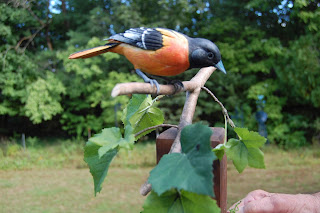When Ray Tameo was a young boy and
his friends invited him to play baseball, he usually turned them down in favor
of going birdwatching. The retired highway bridge designer from Attleboro later
combined his passion for birds with his interest in duck hunting and began experimenting
with carving duck decoys.
Today, Tameo is an award-winning
bird carver whose carvings are in numerous private collections and exhibited
around the region. He will be one of a dozen carvers who will display their
work at the Audubon Society of Rhode Island’s annual Bird and Wildlife Carving Exposition in Bristol on November 3 and 4 from 10 a.m. to 4 p.m.
“I’m entirely self-taught, and the
longer you’re at it, the better you get,” said Tameo. “The more you put into it,
the more you get out of it.”
Tameo’s carving evolved from duck
decoys to small songbirds, which typically take him about 125- to 150-hours to
complete. Working in his basement workshop or garage, depending
on the weather,
he carves highly detailed birds perched in lifelike settings. His carvings are
made almost exclusively from tupelo wood from Louisiana because of its light
weight, absence of grain, whitish color and ease of carving.
“It also takes paint beautifully,”
he said.
The first step, he said, is to draw
the bird’s profile on the wood, then cut it out using a small band saw.
“From
that, I put a centerline down the middle and start shaping the bird and cutting
off excess wood. Then I use Dremel tools – a rotary tool – to start shaping it
finer and finer. Once that’s done, I do relief carving.”
For the final details, he uses an Exacto
knife to give texture to the feathers and finishes with a burning tool.
Painting the birds involves two coats of acrylic sealer and seven or eight
layers of paint.
“I’m very meticulous; I’m a
perfectionist,” he said. “Down the road, I’m going to be long
gone, and my
carvings are going to be in somebody’s house, so I don’t want to produce a
mediocre bird. I want a bird that will last. It will speak for me when I’m gone.”
Most of Tameo’s carvings are
commissioned by clients and collectors he meets at exhibits like the Audubon
show. One man in Bristol has purchased 17 of his shorebird carvings over the
last five years.
While he occasionally enters carving
competitions or gives lessons to beginning carvers, Tameo said he’s too busy to
focus on anything but the work his clients commission him to produce. He just
finished painting carvings of an eastern bluebird perched next to an abandoned
woodpecker hole and a Baltimore oriole on a maple tree branch. He even carved
each maple leaf on the branch. Now he is in the early stages of work on a
three-quarter size common loon and a life-sized black-capped chickadee and
northern cardinal.
His
most visible work, however, was done for Greg Esmay, the owner of the popular Old
Grist Mill Tavern in Seekonk, which burned down in 2012 after a tractor trailer
rolled over, slid into the building, and ruptured a gas line. Prior to the
fire, the restaurant displayed Esmay’s extensive collection of antique duck
decoys, most of which were damaged in the fire and subsequent demolition of the
structure. Tameo restored 35 of them.
“I put new heads on some, made other
repairs on others, and I made them all look antique-ish again,” he said
proudly. “Then he asked me to carve three Canada geese flying that I mounted on
a piece of wood from the original restaurant.”
The geese are now hanging over the
rebuilt restaurant’s fireplace. Esmay purchased several original Tameo carvings
as well, including a puffin and kingfisher.
Out of all of his carvings, Tameo is
most proud of his rendering of an eastern meadowlark perched on a barbed
wire-wrapped fencepost, the bird’s head tilted back and its beak open wide as
if in full song.
“That’s my favorite,” he said. “I
won’t part with that one.”
The Bird and Wildlife Carving
Exposition takes place at the Audubon Nature Center and Aquarium, 1401 Hope
St., Bristol. In addition to the exhibition of finished carvings, some of the
participants will demonstrate their carving techniques. For more information,
visit www.asri.org
or call 401-949-5454. Admission is $5.


No comments:
Post a Comment